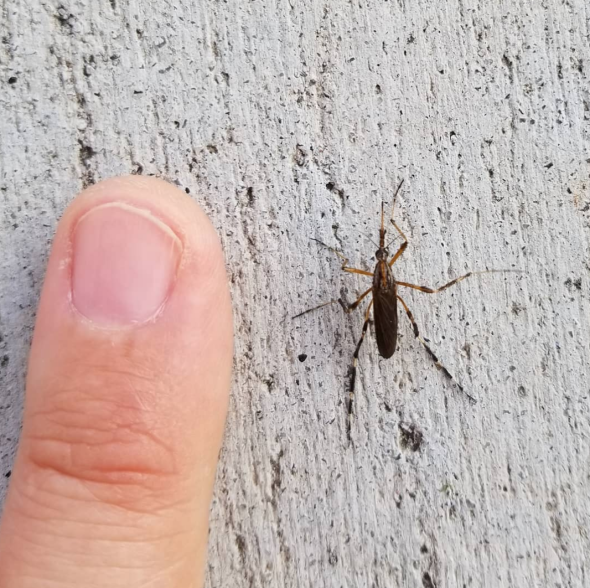Enormous, aggressive mosquitoes swarm Florence-ravaged parts of North Carolina
Amid post-Florence cleanup efforts in parts of North Carolina, some people are having to fend off swarms of large, aggressive mosquitoes up to four times the typical size in the wake of record flooding left behind from the Category 1 hurricane last month.
In one video posted to Facebook, North Carolina resident Cassie Vadovsky told her young daughter as they contemplated fleeing their car as quickly as possible to escape the huge pests flying outside, "They're not wasps; they're mosquitoes."
"I hope not everybody is having to deal with this; it's so bad," Vadovsky said in the video.

A resident of Brunswick County, North Carolina, demonstrates the size of the gallinipper mosquito, which has swarmed parts of the Florence-ravaged state after record flooding. (Instagram photo/@molliejolindholm)
Charlotte resident Suzy Leon and her husband recently had to fend off a swarm of the pests while walking through a wooded area. "I had never seen mosquitoes that big," Leon told AccuWeather. "We swatted at them as we walked through, but it was not enough."
Leon was bitten at least 30 times on her arms, legs, stomach and back, she said.
The Psorophora ciliata mosquito, commonly known as gallinippers, are able to bite through denim and thin layers of certain clothing material, like cotton, according to Dr. Michael Reiskind, assistant professor of entomology at North Carolina State University.
"For the most part, what we're dealing with are mosquitoes that we have here all the time, even the giant ones, but in pretty low numbers," Reiskind told AccuWeather. "Then, when we get a storm like Florence, they come out in vast numbers and people are noticing them because there are many, many millions more of them now."
The numbers of these mosquitoes could possibly be in the billions, although it's difficult to obtain an actual estimate, according to Reiskind.
An increase in mosquito populations is not uncommon after a hurricane or major flooding, according to the North Carolina Department of Health and Human Services Division of Public Health.
With the rise in mosquito numbers comes a greater likelihood of being bitten by the pests, which are known to potentially carry diseases including the West Nile virus, La Crosse encephalitis and eastern equine encephalitis.
The Division of Public Health also stated that the kinds of mosquitoes that can spread viruses may increase two weeks, up to two months after a hurricane, "especially in areas that did not flood but received more rainfall than usual."
To combat the growing concern, North Carolina Gov. Roy Cooper ordered on Sept. 26 that $4 million be allocated toward mosquito control in the 28 counties currently under a major disaster declaration, including Cumberland, Wayne, Brunswick and Craven counties.
"To help local communities in the aftermath of Hurricane Florence, I've directed state funds for mosquito control efforts to protect people who live in hard-hit areas," Cooper stated in a press release.
Each county's fund allocation will be based on their share of the total acreage requiring mosquito treatment in the disaster-declared counties, the Governor's Office states.
In Brunswick County, where pest control management initially began spraying for mosquitoes with trucks on Sept. 24, officials began county-wide aerial mosquito spraying on Oct. 1 to eradicate the flourishing mosquito population, according to the county's website.
Reiskind anticipates that mosquito populations will fade away over the next month as weather conditions become colder.
"Usually, [for an insect to die from cold], you really need to get down to close to freezing, with some variations in species and conditions," Reiskind said.
AccuWeather Senior Meteorologist Joe Lundberg doesn't expect temperatures to drop low enough to hinder mosquito activity in affected areas of North Carolina for at least the next couple of weeks.
"Temperatures will be above to much above normal through at least next Friday," Lundberg said. "Normal highs in Raleigh and Fayetteville, for example, tend to be in the low to mid-70s Fahrenheit during the first half of October, with normal lows of 50-55," Lundberg said.
To prevent being bitten, DEET-based repellents are considered to be the most effective, even against the current large number of mosquitoes, according to Reiskind.
Experts also recommend covering arms and legs with long sleeves and pants and installing or repairing screens on doors and windows to keep mosquitoes out of your home.
"The numbers are so high that you don't really want to be outdoors for very long," Reiskind said. "So, staying indoors is still a way of avoiding being bitten."
